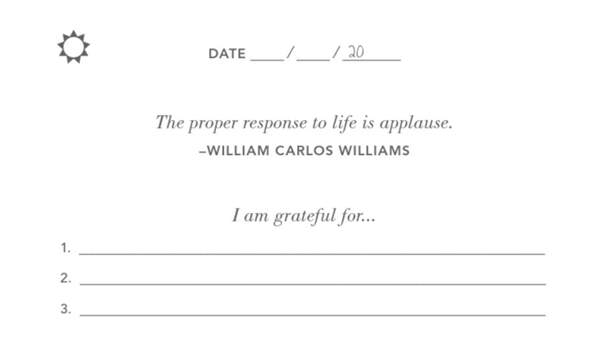I love everything about Thanksgiving except one thing: giving thanks.
Don’t get me wrong, thankfulness is great. In fact, gratitude is one of the most restorative and physiologically beneficial emotions we can experience. Gratitude impacts everything from our brains to our bodies to our businesses.
As Zig Ziglar says, “Gratitude is the healthiest of all human emotions. The more you express gratitude for what you have, the more likely you will have even more to express gratitude for.”
Related: Begin With Gratitude and Watch the Miracles Flow Your Way
Unfortunately, gratitude isn’t our default response to life. Why?
Because as humans, we’re hardwired for survival, and that means fear is the most dominant human emotion. Psychologists call this “loss aversion”: the natural human tendency to avoid loss rather than acquire gain. In other words, we’re constantly on the lookout for what’s wrong.
Beyond biology, nothing feels more inauthentic than being asked, “What are you thankful for this year?” and trotting out some well-worn cliché through gritted teeth.
But it turns out that “faking” thankfulness—that is, taking mental and physical action prior to the feelings—actually makes you more thankful.
Why You Should “Fake” Thankfulness
Philosophers have long known that as the mind goes, so go the emotions. A pithier way to say that would be, we become what we think.
Just in case that sounds a bit too ethereal for you, this truth is a bedrock principle in treating depression through cognitive therapy.
Along with neurological chemistry, people with depression are often caught in “negative feedback loops.” Someone feels negative, so they think—i.e., tell themselves—negative thoughts. Those negative thoughts reinforce the original negative feelings leading to more negative thoughts… and down and down we go.
Fortunately, that downward spiral also works in reverse, not by first feeling positive and then thinking positive thoughts, but instead by intentionally thinking positive thoughts that lead to genuinely positive emotions.
Related: 7 Practical Tips to Achieve a Positive Mindset
As Alex Korb, a neuroscientist at the University of California, Los Angeles and author of The Upward Spiral, explains: “You can turn a tendency toward a downward spiral of depression and anxiety into an upward spiral of joy and clarity in your life. Expressing gratitude activates serotonin production, which improves your mood and allows you to overcome bad habits, giving you more to be grateful for.”
Or consider the words of fellow cynic, Arthur C. Brooks from The New York Times:
“Building the best life does not require fealty to feelings in the name of authenticity, but rather rebelling against negative impulses and acting right even when we don’t feel like it. In a nutshell, acting grateful can actually make you grateful.”
Even more powerful than just thinking thankful thoughts is giving them concrete written form. Tools like the Five Minute Journal, which Tim Ferriss calls a “therapeutic intervention,” are designed to jumpstart your day with a mental infusion of gratitude.

SAMPLE FROM THE FIVE MINUTE JOURNAL DAY PAGE
Why this “intervention?” Because, in Ferriss’s words, being a “happier person, a more content person… is not something that comes naturally to me.”
Hear, hear.
And that’s really what “faking” is all about: If you wait until you feel grateful to act grateful, you’re rolling the dice and will end up falling back on your default emotional state. The best way to experience the benefits of gratitude is to start with action, develop your mental and physical “gratitude muscles.” This can be as simple as devoting your thoughts to thankfulness or digging deep into the details.
Related: 5 Ways to Be More Grateful on the Daily
Check out the infographic below to learn just a few of the scientific benefits of thankfulness and exactly how to put gratitude into action.

SOURCE: INTELLIGENTCHANGE.COM
Related: 129 Reasons to Be Thankful



